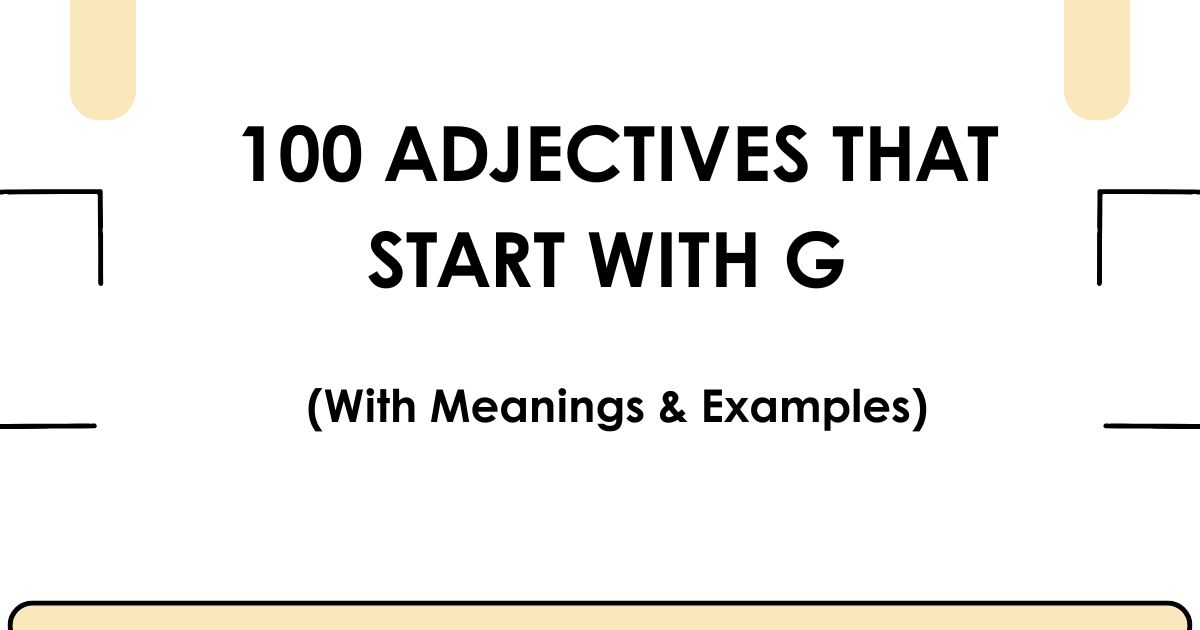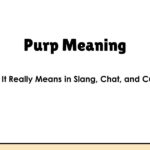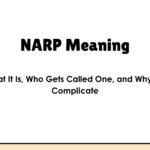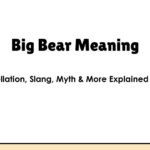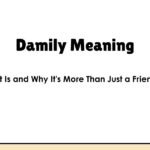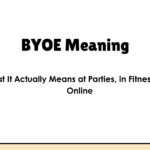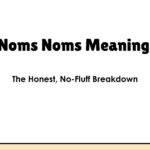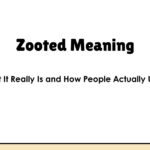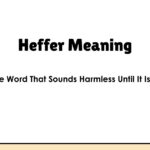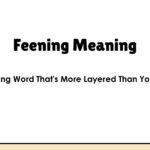I’ve always loved how one small word can change the tone of a sentence — especially adjectives that start with G. They sound bold yet graceful, from gentle to gritty. Over the years, I’ve collected and used these words while teaching English and helping new writers express themselves more clearly.
So, in this guide, I’ve gathered 100 useful G adjectives — not just for learning, but for using in real writing. You’ll find easy meanings, short examples, and even small tips to help you remember and use them naturally.
Why “G” Adjectives Stand Out
The letter G gives us some of English’s most vivid describing words — from gentle and graceful to grim and grotesque. They capture feelings, textures, appearances, and attitudes with precision.
Writers love G adjectives because they’re versatile: you can use them to describe beauty, bravery, gloom, humor, or grandeur. They also carry a strong rhythm — many sound soft (gracious, golden) or bold (gritty, gallant), making them perfect for storytelling and expressive writing.
Positive Adjectives That Start With G
These adjectives highlight kindness, beauty, or uplifting qualities. Use them when you want to praise someone, describe a pleasant experience, or create a warm, optimistic tone.
| Word | Meaning | Example Sentence |
| Generous | Willing to give freely | My teacher is generous with her time and advice. |
| Gentle | Kind and mild in nature | The gentle rain cooled the summer heat. |
| Genuine | Real and sincere | Her genuine smile made everyone feel welcome. |
| Graceful | Moving with elegance and control | The skater’s graceful turns drew applause. |
| Grateful | Feeling thankful | I’m grateful for the lessons my parents taught me. |
| Great | Excellent or significant | It was a great day for a family picnic. |
| Glamorous | Stylish and excitingly attractive | The actress arrived in a glamorous red gown. |
| Glorious | Magnificent or delightful | We watched a glorious sunrise over the hills. |
| Glossy | Smooth and shiny | The glossy brochure caught my attention. |
| Golden | Made of or resembling gold | The golden light filled the evening sky. |
| Gorgeous | Exceptionally beautiful | That’s a gorgeous photo of the ocean. |
| Gracious | Courteous and kind | She was gracious even in defeat. |
| Grand | Impressive in size or style | The grand hall echoed with music. |
| Gifted | Naturally talented | He’s a gifted writer with a unique voice. |
| Giving | Generous and caring | Her giving spirit inspires others to volunteer. |
| Glad | Happy and pleased | I’m glad we could meet after so long. |
| Gleaming | Shining brightly | The car’s gleaming surface reflected the sun. |
| Gleeful | Full of joy and excitement | The children were gleeful on the playground. |
| Glistening | Sparkling with reflected light | Dewdrops were glistening on the morning grass. |
| Glittering | Shining with many flashes of light | She wore a glittering necklace that sparkled under the lights. |
| Good | Morally right or high-quality | That’s a good idea worth sharing. |
| Gratifying | Giving satisfaction | Seeing her students succeed was deeply gratifying. |
| Gregarious | Sociable and outgoing | He’s a gregarious person who loves meeting new people. |
| Grounded | Realistic and balanced | She stays grounded despite her success. |
| Gutsy | Brave and determined | Starting a business from scratch was a gutsy move. |
| Genial | Cheerful and friendly | The genial host welcomed everyone warmly. |
| Good-natured | Pleasant and kind | Their good-natured banter made everyone laugh. |
| Good-hearted | Caring and compassionate | My good-hearted neighbor always checks on the elderly. |
| Groovy | Cool and stylish (informal) | That’s a groovy playlist — classic but timeless. |
| Giddy | Lightheaded or joyful | She felt giddy after hearing the good news. |
Teacher’s Tip: When you’re learning adjectives, connect them to feelings or real situations. For example, think of grateful after someone helps you, or gracious when you accept a compliment kindly. The more you tie words to emotions, the faster they stick in your memory.
✨ Try using three of these G adjectives in your next message or journal entry — notice how they make your writing livelier.
Negative Adjectives That Start With G
While not cheerful, negative G adjectives add depth and realism to your writing. They help describe challenges, tension, or serious moods — great for storytelling, reviews, or emotional scenes.
| Word | Meaning | Example Sentence |
| Grim | Serious or depressing | The soldiers faced a grim reality. |
| Grumpy | Irritable or bad-tempered | He’s grumpy until he’s had his coffee. |
| Guilty | Feeling responsible for wrongdoing | She felt guilty for missing her friend’s call. |
| Gloomy | Dark or cheerless | The gloomy weather matched my mood. |
| Greedy | Wanting more than is fair | The greedy landlord raised the rent again. |
| Gross | Disgusting or unpleasant | The leftovers smelled gross after a week. |
| Grouchy | Easily annoyed | The grouchy cat hissed at everyone. |
| Gullible | Easily tricked | Don’t be so gullible — check the facts first. |
| Glaring | Very obvious | There was a glaring mistake in the report. |
| Glib | Smooth but insincere | His glib answers didn’t convince anyone. |
| Glum | Quietly unhappy | He looked glum after losing the match. |
| Graceless | Lacking poise or refinement | His graceless dancing made everyone chuckle. |
| Grandiose | Overly showy or exaggerated | He had grandiose dreams of fame and fortune. |
| Grave | Serious and important | The teacher spoke in a grave tone. |
| Greasy | Oily or slick | The greasy fries left stains on the paper bag. |
| Grievous | Causing sorrow or pain | The loss was a grievous blow to the family. |
| Grimy | Covered in dirt | The mechanic’s hands were grimy from work. |
| Grisly | Causing horror | The film depicted a grisly battle scene. |
| Grotesque | Distorted and ugly | The sculpture had a grotesque expression. |
| Grueling | Extremely exhausting | The climb was a grueling test of endurance. |
| Gruesome | Horrifying and shocking | The detective described a gruesome discovery. |
| Gruff | Harsh or unfriendly in manner | His gruff voice hid a gentle heart. |
| Gangly | Tall and awkward | The gangly teenager stumbled during practice. |
| Garish | Flashy in a tasteless way | The room’s garish colors hurt my eyes. |
| Garrulous | Overly talkative | My garrulous uncle can talk for hours. |
| Gaudy | Showy but lacking taste | She wore a gaudy dress covered in sequins. |
| Gaunt | Thin and pale from hardship | His face looked gaunt after weeks of illness. |
| Gawky | Clumsy or awkward | He was a gawky kid who grew into confidence. |
| Ghastly | Terrifying or dreadful | It was a ghastly accident. |
| Ghoulish | Morbidly interested in horror | The journalist’s ghoulish fascination upset readers. |
Common Mistake Learners Make: Many learners use gross or gruesome in the wrong context. Gross means “disgusting” but is casual, often for smells or food. Gruesome is more serious — used for shocking or bloody scenes. Try not to mix them up depending on tone.
⚠️ Use negative adjectives sparingly — they’re powerful for mood, but too many can drain your writing’s tone.
Read Also: 120 Adjectives That Start With C (With Meanings & Examples)
Neutral & Descriptive Adjectives That Start With G
Not every adjective is about good or bad — some just describe what is. These neutral G adjectives are useful for school essays, reports, and factual writing when you want to stay objective and clear.
| Word | Meaning | Example Sentence |
| Green | The color of grass | The green valley was full of life. |
| Gray | A color between black and white | The gray clouds promised rain. |
| Grey | British spelling of gray | The grey fog rolled over the city. |
| Global | Relating to the whole world | Climate change is a global concern. |
| Gradual | Happening slowly | Recovery was a gradual process. |
| Graphic | Showing vivid or explicit detail | The novel included graphic descriptions of war. |
| Gusty | With strong winds | Gusty conditions delayed the flight. |
| Gigantic | Extremely large | A gigantic tree towered over the park. |
| Girly | Feminine in style | Her room had a girly theme with pastel decor. |
| Guarded | Cautious or reserved | He gave a guarded response to the reporter. |
| Gooey | Sticky and soft | The cookies were warm and gooey inside. |
| Goofy | Silly and playful | His goofy dance made everyone laugh. |
| Gory | Showing blood or violence | The movie was too gory for children. |
| Gossamer | Light and delicate | She wore a gossamer veil that shimmered. |
| Grainy | Rough in texture | The old film looked grainy but nostalgic. |
| Granular | Made of small grains | The sugar had a granular texture. |
| Gravitational | Related to gravity | The moon’s gravitational pull affects tides. |
| Gritty | Containing grit or showing toughness | The gritty streets told stories of hard lives. |
| Grizzled | Streaked with gray hair | The grizzled fisherman smiled knowingly. |
| Growing | Increasing in size or number | The growing crowd filled the stadium. |
| Guaranteed | Promised or assured | The product comes with a guaranteed refund. |
| Guiltless | Innocent, free from blame | The jury declared him guiltless. |
| Gushing | Flowing out quickly | Water came gushing from the broken pipe. |
| Gymnastic | Relating to gymnastics | She performed impressive gymnastic stunts. |
| Gaping | Wide open | There was a gaping hole in the fence. |
| Gaseous | In gas form | Carbon dioxide is a gaseous compound. |
| Gauzy | Thin and transparent | A gauzy curtain softened the sunlight. |
| Generic | Not specific to a brand | I bought a generic version of the medicine. |
| Genetic | Related to genes | Some traits are purely genetic. |
| Geopolitical | Involving geography and politics | The region faces complex geopolitical issues. |
| Geriatric | Relating to old age | The hospital has a geriatric care unit. |
| Germane | Relevant and fitting | His point was germane to the discussion. |
| Ghostly | Pale or resembling a ghost | A ghostly shape appeared in the mist. |
| Giant | Extremely large | The giant panda is native to China. |
| Gnarly | Twisted and rough (or cool, informally) | The old oak tree had gnarly roots. |
| Geographic | Related to location | The country’s geographic diversity is stunning. |
| Geological | Relating to earth’s structure | The canyon reveals geological history. |
| Geometric | Based on shapes and lines | The design features geometric patterns. |
| Glassy | Smooth like glass | The lake looked glassy at dawn. |
| Glazed | Covered with a shiny coating | The donuts were sweet and glazed. |
| Governmental | Related to government | Governmental policy changed after the election. |
| Gracile | Slender and elegant | The bird had long, gracile legs. |
📚 Etymology Spotlight A few of these G adjectives have interesting roots:
- Generous comes from the Latin “generosus”, meaning “of noble birth.”
- Genuine comes from Latin “genuinus,” meaning “natural” or “authentic.”
- Gritty traces to Old English “grit,” meaning “small stones” — so it literally means “having grit.”
Knowing where words come from can make them easier to remember and more fun to use.
Read Also: 120 Adjectives That Start With D: (With Meanings and Examples)
How to Use “G” Adjectives Effectively
Over the years, I’ve noticed that knowing a word isn’t enough — what really matters is how you fit it into real writing. Here’s what I tell my students and readers when they’re unsure which adjective to use:
- Be specific: Choose “gorgeous” instead of “nice”; “gritty” instead of “rough.”
- Create contrast: Mix positive and negative: “a gracious host with a guarded heart.”
- Match tone to purpose: Academic? Try “germane” or “global.” Creative? Go for “gleaming” or “ghastly.”
- Don’t overstack: One precise adjective beats five vague ones.
Tip: Replace overused words like “good” or “nice” in your next paragraph with sharper G adjectives — you’ll instantly sound more fluent and engaging.
Fun Facts About G Adjectives
Curious where these words came from? Here are a few fun and surprising facts about G adjectives — their origins, meanings, and how they’ve evolved in English over time.
- Most G adjectives trace to Latin or Greek roots — generous (Latin genus, “birth”) and graphic (Greek graphikos, “drawing”) according to Online Etymology Dictionary.
- “Good” is one of the oldest G adjectives, dating back over a thousand years.
- Some words shift meaning with tone — glib can mean smooth-talking or deceitful.
- “Grey” vs. “Gray” — both correct; choose one and stay consistent.
- The longest everyday G adjective? Gastrointestinal — a 16-letter medical term!
FAQs About Adjectives Beginning With G
What are the most common G adjectives?
Common ones include good, great, green, general, and given — used daily across writing and speech.
Are there more positive or negative G adjectives?
They’re evenly balanced, letting writers express hope or hardship equally well.
Can G adjectives describe personality?
Yes — try gregarious, grumpy, generous, gullible, or gracious for personality writing.
Which G adjectives work best for creative writing?
Use sensory-rich options like glistening, ghastly, graceful, or grotesque — they add texture and emotion.
Is “gray” or “grey” correct?
Both mean the same thing. “Gray” is American; “grey” is British. Choose one style consistently as explained by Merriam Webster.
Can I use multiple G adjectives together?
Yes, if they complement each other: “a gifted, grounded leader.” Avoid piling too many — clarity matters more.
Final Thoughts
I’ve used these G adjectives in my own writing, teaching, and even daily journaling. Some of them — like gutsy, grateful, and genuine — remind me of people who’ve inspired me most. Words carry feelings, and the more you use them with awareness, the more natural your writing will sound.
Before you go, try this small challenge: pick three G adjectives that feel like you and write one short story or caption using them. You’ll be surprised how much personality a single letter can hold.
Try this quick exercise: Pick three new G adjectives you’ve never used before, and write one sentence for each. The more you practice, the more naturally they’ll flow into your daily writing.

Hi, I’m the creator of Legacystance.com, dedicated to making English learning simple and enjoyable. I write clear, practical guides on adjectives, verbs, idioms, pronunciation, spelling, and more. Every article is carefully researched to give accurate, easy-to-understand information. My goal is to help readers improve their English skills confidently, one step at a time, with content that is trustworthy, useful, and beginner-friendly.
